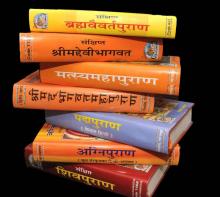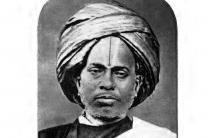A person who carries out his duties without considering it an offering, will not even gain the good in this world. Then, how can he obtain a good state in other worlds? Mokṣa is the best among the four cardinal aims of human life. Karma helps achieve dharma, artha and kāma (dharma, wealth, and enjoyment). Even so, karma is the necessary first step for mokṣa. Mokṣa is liberation from the burden of the universe.
Author:hari
This is a short list of poetic works in Sanskrit. Most of the works included here are well known to our literary tradition. This list is divided into two parts: The first part keeps in mind a lover of Sanskrit poetry who might not actively compose verses in the language. The second part comprises works that a budding Sanskrit poet who is serious about his passion ought to read. Needless, the first part is a must-read for budding poets as well.
The Purāṇas occupy a high rank amongst India’s literary contribution to the world. In addition to being written lore of the highest magnitude, the Purāṇas have also remained in the oral tradition, percolating to the grassroots.
After listening to these words, Padmāvatī thought for a while and said “It wasn’t right of you to tell me only now about your friend. I consider him now as my elder brother. So, mustn’t I receive him with due honours?”
The interpretation and elaboration that Mantap does for the line raṅganyātakè bārano is extraordinary. He shows several different emotions of the gopikā as he enacts the line. O Raṅga! Why haven’t you come? – Do you think I am ugly? Or has our love lost lusture? Have other women captured you more than me? Or am I hallucinating? I am not able to bear this! Why is he so proud? Why is he arrogant and insensitive? Why do you still ignore?
Appendix
[A few incidents which highlight Rungacharlu’s nature and character can be seen in an article published in the Deccan Herald dated 7th December 1961. The writer of this article, Sri A S R Chari, was Rungacharlu’s grandson. He worked as a Judge in the Mysore High Court for a brief period before his retirement.]
Language is perhaps the best mode of communication available to humans. Literature—poetry in particular—is the acme of language. There are several ancient classical languages, but Sanskrit is the only one with an unbroken tradition of thousands of years. It has produced numerous poetic works of an astounding variety.
rāṣṭraṃ vā aśvamedhaḥ…
– Yajurveda (Taittirīya-brāhmaṇa 3.8.9)
kalpate ha vai tatra prajābhyo yogakṣemaḥ
yatraitena yajñena yajante– Yajurveda (Taittirīya-brāhmaṇa 3.8.13)
The nation itself is the Aśvamedha (aśva represents the State)... with that both gain (yoga) and well-being (kṣema) of the citizens are achieved…
Mṛgāṅkadatta spent the night there and left for Ujjayini the following morning. On his way, he saw a terrible-looking person carrying away his minister Vikramakesarin in the skies. Looking at Mṛgāṅkadatta, he stopped at the point and let the minister down. Vikramakesarin prostrated at the king’s feet. They embraced each other. Then he told the man who had brought him, “You may reappear when I think of you. Now carry on!” before sending him away.








